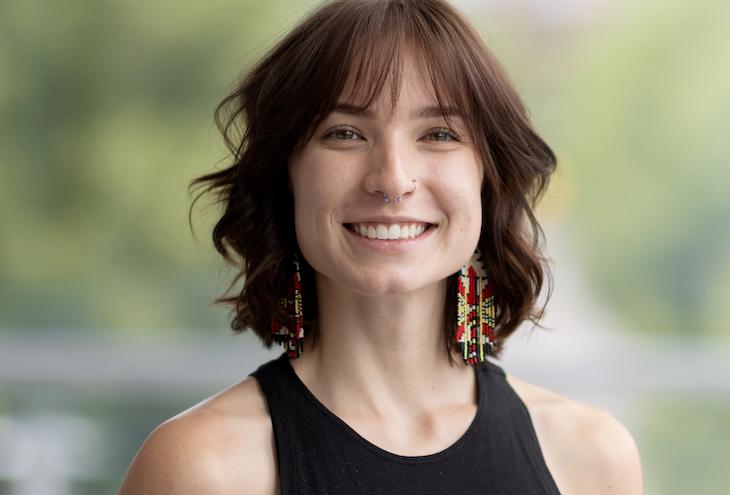Jordyn Cates’ journey toward a career in clinical psychology has been a process of unraveling her family’s past to reconnect with her Indigenous roots. A member of the Okanagan Indian Band, she’s come to realize that her decision to study nearby at the University of British Columbia’s Okanagan campus (UBCO) was partly driven by this desire to reconnect.
Cates’ experience with her family’s Indigenous community was limited to brief stays with her grandmother, who was often away working with Indigenous communities in BC and Yukon, “Living off-reserve with my mom while my grandma was contributing to different communities showed me you can still be connected to your community while not being right there,” says Cates.
While this link had felt natural in elementary school, where she was immersed in cultural activities, she says that as someone “very white passing,” she was shamed for being “whitewashed” in secondary school. Despite being wary of similar rejection when she arrived at UBCO, she was eager to lean into her Indigenous identity.
Her first two years of undergrad were spent struggling to keep up with the challenging workload. Then before her third year, Cates was accepted into UBCO’s Indigenous Research Mentorship Program (IRM) by Rachel Andreychuk, whom she credits for transforming her life’s trajectory.
Through this program, Cates not only connected with the university’s vibrant Indigenous community but also found her calling, working with psychology professor Dr. Zach Walsh in cutting-edge cannabis research. Fascinated by the motivations and repercussions of substance use, Cates was inspired by Dr. Walsh’s assertion that cannabis can be a therapeutic tool. “It was a weird moment within society when this substance that had been so demonized was now legalized,” Cates explains. “I started to learn how cannabis can be used for substitution, decreasing someone’s use of alcohol or opioids. What does this mean for Indigenous people who are disproportionately impacted by the toxic drug supply?”
Looking at existing cannabis research related to Indigenous peoples, Cates observed the vast majority reflected stigmatizing colonial bias. Her research with Dr. Walsh determined that more frequent use wasn’t necessarily problematic, and she presented the results of a study focusing on differing cannabis motivations by ethnicity at the Canadian Centre on Substance Use and Addiction conference.
Throughout this time, Cates stayed grounded by playing ringette (a winter sport similar to hockey) and helping her Kelowna team win the Western Canadian Championships twice. She was also becoming more immersed in her university’s Indigenous community, mentoring other students, and gaining new perspectives through an Indigenous studies course.
Attending her first AISES in Canada National Gathering at McGill University in Montreal was a particularly life-changing opportunity. Impressed by the opening ceremonies and meetings with passionate STEM students, Cates began planning a UBOC AISES chapter on the flight home. “It was so mind-blowing that these communities could connect on this big a level,” Cates says. “All Indigenous students need to see this — to have access to these resources. I wanted people who weren’t in STEM to see this collaboration.”
At the next gathering in Saskatchewan, Cates again felt a “huge flood of passion, drive, warmth, and support” and started working with student Chris Paul on establishing a UBCO chapter and applying for a special grant. Ahead of this year’s gathering, they’re planning cultural workshops and preparing OCAP (ownership, control, access, possession) training for members to understand the negative history of exploitative Indigenous research.
Now in her first year of a master’s program, Cates continues to work with Dr. Walsh and build partnerships with Indigenous communities. She’s come further than she ever believed possible while combining her research interests and Indigenous values. “I feel very fortunate to be here,” says Cates of her program, which allows her to give back to the community by addressing some pressing Indigenous issues. “Getting into this clinical psychology program is definitely a huge peak. It feels like coming full circle, like I had found gaps in literature and here I am sewing those gaps together.”













